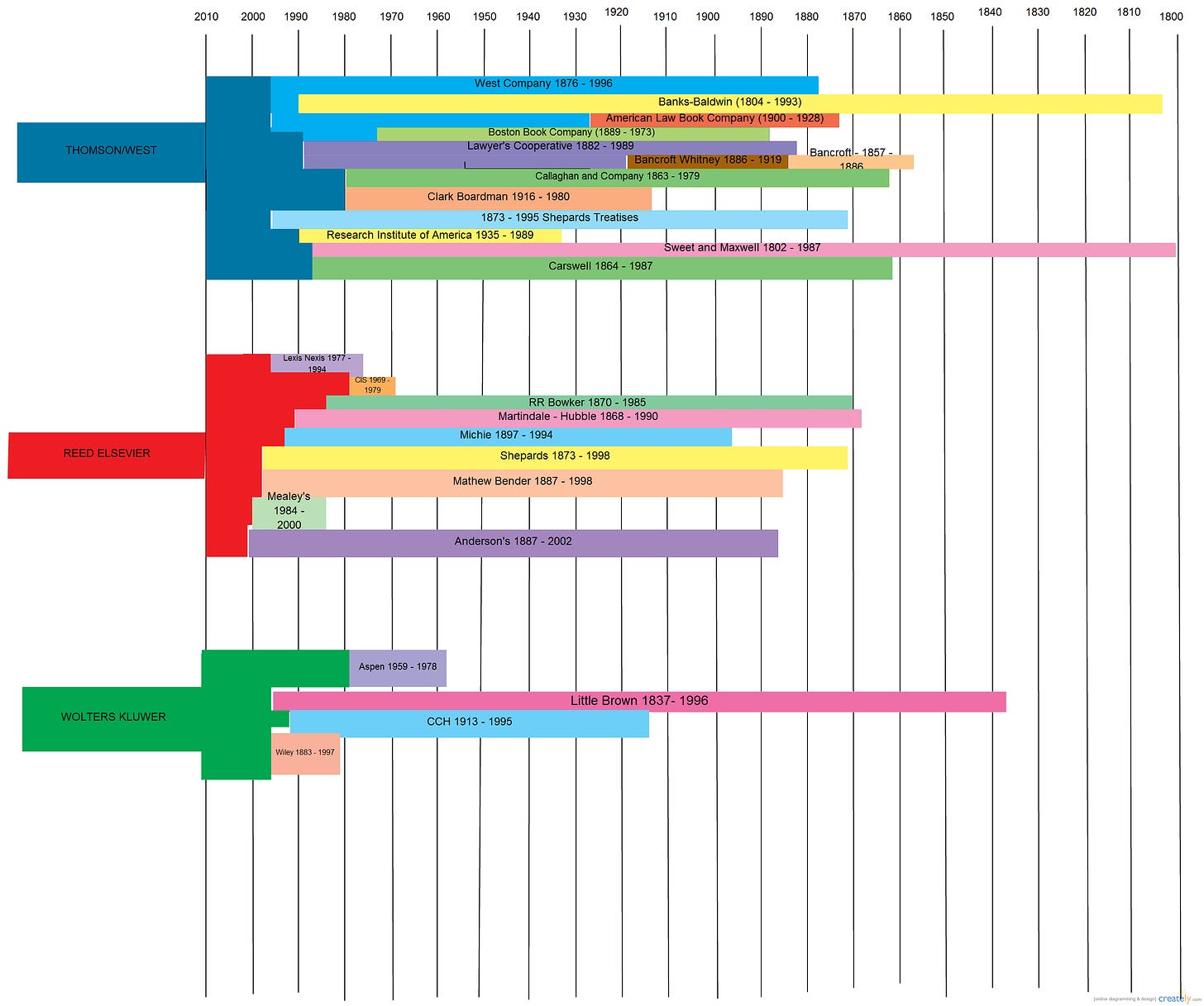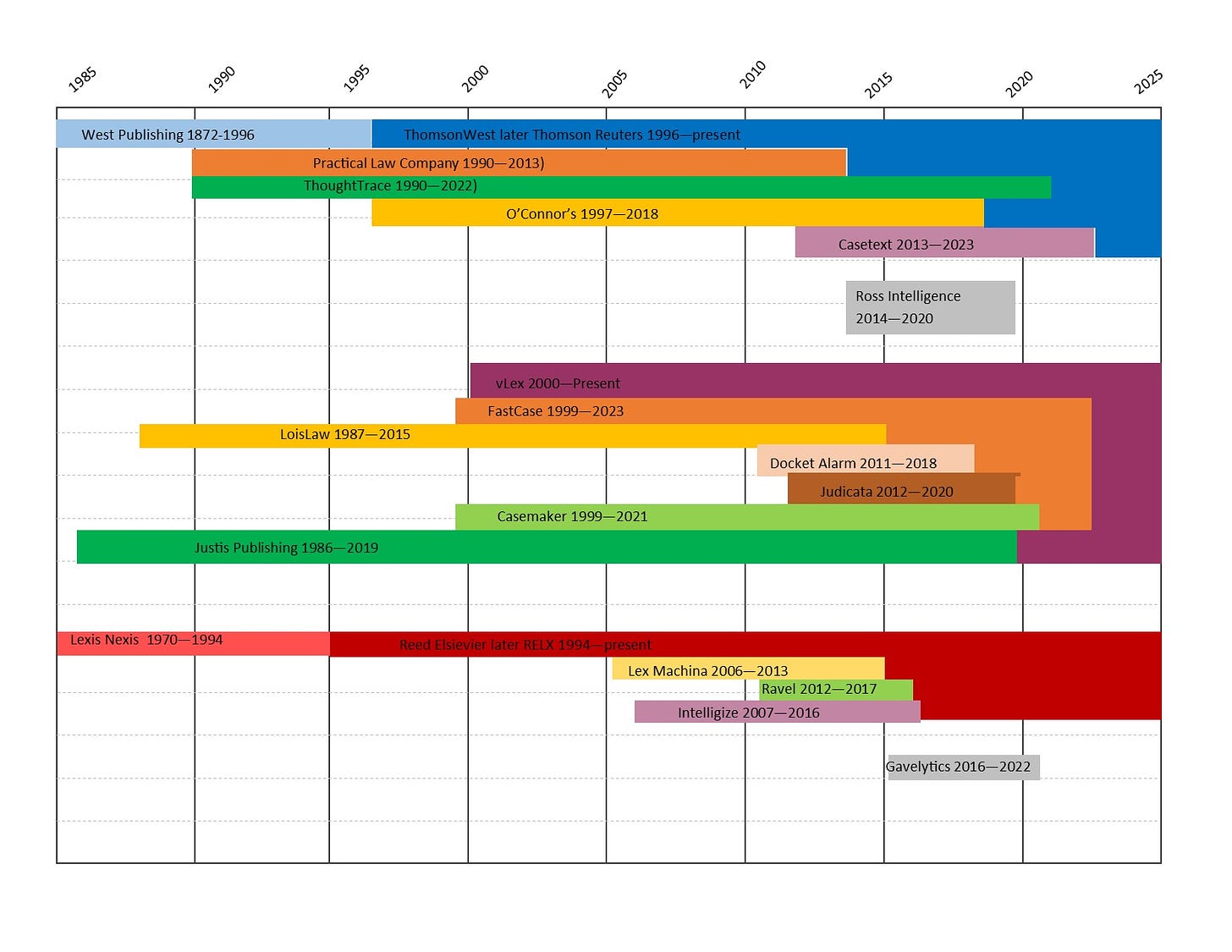Hello Friends in the Computer,
So I guess everyone’s talking about the fact that TR is going to acquire Casetext for $650 million dollars.
Before I get into my thoughts, which are muddled, I do want to make one thing abundantly clear: I really like and respect the team at Casetext and they are absolutely setting the bar for the intelligent use of AI in the legal world. I hope for nothing but the best for them. They started a legal research company at a time when it was a true David vs. Golaith endeavor, busted their buns for 10+ years, pivoted when necessary, and came up with novel products that have the potential for completely upending the practice of law.
I’ve also never heard a bad thing said about their pricing or customer service, which is… big. So while money is never a big motivating factor for me, I know most of the world uses it as a proxy for assessing a person’s abilities or company’s contributions to the world so I’m happy they are getting a huge pay out.
I mean, I guess.
(I am kiiiinda weirded out by how fixated some people are on money as the goal and arbiter of success for working in legal tech? Or the success of legal tech verse other kinds of tech? Maybe I should get out of Indiana more often. Or stop reading tech twitter. One of the two.)
I think anyone who comes here know I’m not a tech cheerleader without overthinking things into the ground, so let get into it..
So besides the “yay money for Pablo and team! (I guess)”, my initial reaction to the news was….mixed? When I read the news right before bedtime on Monday night, I did have an immediate pit in my stomach (a literal gut reaction), but I decided to take a day, read other’s thoughts, and try to think about things before saying anything.
Novel for Sarah “social media stream of consciousness” Glassmeyer, I know. GROWTH, BABY, GROWTH.
I still don’t have a clear idea of what I think , and am generally taking a “wait and see” approach. But I thought I’d bust out a tool from the old LiveJournal days where you summarized your life status and put a (+) or (-) in front each item and see where you stand.
+ happy to see good people get rewarded and hopefully they can basically write their own ticket for the rest of their life and come up with other cool things (or sit on a beach doing nothing if that’s what they want)
- unlike the vLex/Fastcase thing which was a meeting of almost equals, are they going to be absorbed like the Borg? Will they lose their freedom to innovate? Is it going to be a constant exercise in frustration dealing with large corporate overlords?
+/- you’re not their mother, Sarah, let them worry about their freedom and career satisfaction
+ I saw note from Jeroen Plink on LinkedIn who took Practical Law through a Thomson Reuters acquisition and he was positive about the experience and was hopeful about Casetext’s future. So that’s encouraging.
++ (I work with him now. I like him. He’s extremely skilled and knowledgeable in areas that I have no clue about - i.e. money and business - so I defer to his judgement in those areas.)
+ content is king, especially where AI and research/content creation is concerned and no one has more content than TR or the unique types of content that TR has
- THAT IS NOT A GREAT THING. IT’S ACTUALLY ACTIVELY BAD. LIKE, FOR LEGAL TECH AND SOCIETY AS A WHOLE
+ But maybe this access to loads more content will result in more exciting innovations in how AI might be used in legal practice?
- that only certain people can afford to implement
+ also, although Casetext seemed to have good VC support, that’s not a guarantee and can dry up faster than you think. ASK ME HOW I KNOW.
- well now I’m sad about Reynen Court again
+ but anyway, maybe this provides a bit of stability and allow them to continue to come up with cool stuff?
+ it sounds like initially at least the Casetext support and billing will carry over?
- but no indication for how long. dude, do not get me started on TR billing and customer service
- Is the power of TR behind these types of tools going to give them unearned credibility? By which I mean, I’m not entirely sure the use case or need to implement is there for everything and wonder how the investment from TR and their customers is going to tip the scales. see also: we paid for this office so by god you’re not going to wfh anymore
- wait….do we realllly even know if the generative AI tech can do everything thought leaders promise it can?
+ but maybe this will be the kick in the pants legal needs to leap frog into the 21st century?
- (those that can afford it, I mean)
- someone on Twitter made this point as well , but it sort chaps my ass that people have spent the last six months browbeating the legal profession and telling them that if they don’t use AI they will be left behind and unethical and here’s a big shining example of how state of the art (or even baseline) tools and content are made inaccessible to large swaths of those participating in the legal system
+/- (also I know when certain people talk about “what lawyers need to do” with regards to innovation they mean lawyers that work for AmLaw 50/Magic Circle/Seven Sisters type firms because they themselves work in tech in Silicon Valley and that’s the type of lawyers they deal with. So I guess those lawyers will be able to afford WestAI )
+ what can I/all y’all/we do to ensure equitable access to content and tools that will become table stakes in the legal world, let alone innovative?
+ holy cats $650 million dollars is a lot of money
So yeah. Clear as mud. As my contracts professor used to say “Embrace the ambiguity.”
And I should have used emoji instead of “+/-“.
What I do know: I am who I am (professionally) because I was a law librarian in a publicly funded law library 2006 - 2010. We didn’t have…options…for almost anything we needed. There were annual double digit price hikes, we couldn’t afford basic primary law let alone the unique content that the duopoly had, and special terminals they gave us had us purchase for self-represented individuals were SHAMEFUL in their lack of coverage and price. And good luck trying to negotiate with them on any of the above. The power balance was off and EVERYONE (big libraries and small, and the patrons we served) was at the mercy or two or three big companies.
A little over 13 years ago I made a graphic to track legal research mergers. It looked like this:
If history is going to repeat itself, I might as well too:
This is more in the legal research/analytics/ai assistant space, but also the addition of AI to legal knowledge really muddies up the traditional verticals of legal tech and/or adds new ones. (Also, I ran out of time/space so didn’t include Bloomberg, or cool smart drafting tools like Clearbrief or Syntheia or companies like PacerPro or Unicourt that provide access to data and are on the edges of space.) Plus, we’ve all seen Litera’s acquisition spree in the more transactional practice space so TR/Lexis/vLex are not the only ones absorbing companies. I saw someone on LinkedIn say that all legal tech is eventually acquired by ILTA - Intapp, Litera, TR, Aderant.
(I already have too many side projects that I am ignoring but I would love to expand my terribly designed charts with the above sometime.)
I know there can be great benefits - monetary, tech, and other - to consumers and tech founders by combining forces through mergers, integrations, and acquisitions.
<extreme Stephen A. Smith voice> BUT!
I also have experienced what happens when the balance of power goes out of wack and how large corporations can ruin products that were thoughtfully created by a small and nimble team. Because of my past, I am HAUNTED by the prospect of consolidations in legal tech and perhaps react overly strong to them, especially when a behemoth like TR is involved, but maybe…. I’m the Legal Tech Cassandra.
So. Anyway. Happy for good people being rewarded for good, innovative, hard work but also making that Marge Simpson worried “mmmmm” sound. I guess that’s where I’m at.
Be Well,
Sarah
p.s. the title of this post comes from a tweet I saw when searching “Casetext” on Twitter.





